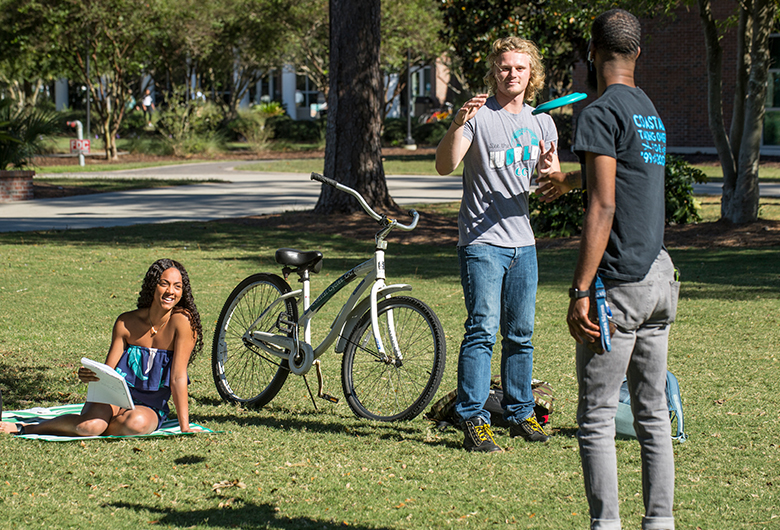Before You Arrive
A visa is required to enter the United States. Most international students come to Coastal Carolina University on an F or J visa. After admission, international students will obtain an I-20 or DS-2019 that allows them to apply for a visa.
Full-time degree seeking international students typically enter the U.S. with an F-1 visa. Visiting, sponsored, and exchange students typically enter with a J-1 visa. A student's spouse or child can apply for an F-2 or J-2 dependent visa. A certificate of eligibility is required to apply for an F or J visa.
Certificate of Eligibility
Admitted international students will receive information by email about the process to receive a Certificate of Eligibility to apply for a U.S. visa. Full-time degree seeking international students are typically issued an I-20, which allows them to apply for an F-1 visa. Visiting, sponsored, and exchange students may be issued a DS-2019, which allows them to apply for a J-1 visa.
Visa Application
You may begin applying for your F or J visa 120 days before the start date on your I-20 or DS-2019. The embassies will not accept visa applications before 120 days prior to the start date. Prior to applying for a visa, new F-1 and J-1 students are required to pay the I-901 SEVIS (Student and Exchange Visitor Information System) fee. After paying this fee, you should complete the Form DS-160 Online Nonimmigrant Visa Application and upload your photo before scheduling an interview with a consular officer. Interview appointment wait times vary, so apply early. For more information on applying for an F visa or a J visa, please refer to the U.S. Department of State website.
Please note, that CCU cannot do anything to change the decision of the U.S. Embassy regarding your visa. If your visa is denied or you are required to wait for administrative processing, the embassy will provide you notification in writing by mail. Most of the time, you can re-apply. Please read any information provided to you at or after your visa interview carefully for details.
Do not purchase an airplane ticket until your visa has been approved.
Transfer Students
If you are in the United States studying at another institution and you have an active SEVIS record, you can have your existing SEVIS record transferred to CCU. Speak to an international student adviser at your current institution about their process for transferring your SEVIS record. CCU must receive the record in SEVIS before the I-20 or DS-2019 can be issued.
Change of Status
If you are in the United States on a visa that is not an F or a J, you can either submit an application to USCIS to change your visa status or travel outside the U.S. and apply for a new visa. If you choose to apply from within the U.S., you must maintain your current visa status until the change of status is approved. This often takes several months. It is much faster to travel outside the U.S. and apply for a new visa.
An enrollment deposit is a $300 prepayment of your tuition. This deposit confirms that you will attend Coastal Carolina University. If you pay the deposit and decided not to attend the University, the deposit will not be refunded. All new students are required to pay an enrollment deposit. However, some international students are exempt from the deposit. Exempt students will still pay the full amount, but a pre-payment is not required.
Who is exempt from the enrollment deposit?
- Exchange students (students studying at CCU for one semester or more from a foreign partner university),
- Double degree students (students who will earn a degree from CCU and a foreign partner university), and
- Some Coastal Carolina University scholarship recipients (this does not include international merit or transfer scholarship recipients).
Why do I need to make my enrollment deposit?
You must make your enrollment deposit before you can do any of the following:
- Enroll in classes,
- Apply for housing, or
- Register for Orientation.
To make your enrollment deposit, click here: http://www.coastal.edu/deposit/
The University requires that students provide proof of immunization AND complete all required Student Health Services forms (listed in the Required Documentation for Immunization Compliance section below) prior to attending the University.
Proof of immunization records must be verified, signed and/or stamped by a physician, physician assistant, nurse practitioner or the health care facility. Your immunization record must include the month, day and year the vaccine was given. All immunization records must be submitted in English.
For more information on how to submit immunization records please visit the Upload Immunization Records tab.
Please allow 24-72 hours for your immunization records to be verified after submission.
Required Documentation for Immunization Compliance:
- Proof of required immunization (required immunizations listed below)
- Health History Form
- Meningitis Waiver Form
- TB Risk Assessment Form
Required Immunizations:
- M.M.R. (Measles, Mumps, Rubella) doses 1 and 2
- (2 doses required at least 28 days apart for students born 1957 or later and all health sciences students).
- First dose is given at age 12 months or later.
- Second dose is given at least 28 days after first dose.
- Tetanus (Td or Tdap) vaccination within the last 10 years.
Recommended Immunizations:
- Hepatitis A (2 doses)
- Hepatitis B (3 doses)
- Varicella (chickenpox) - (2 doses)
- Human Papillomavirus Vaccine (HPV) (HPV9 - 3 doses)
- Influenza (flu)
- COVID-19
Immunization Exemptions:
Immunization requirement waivers may be obtained for the following reasons: students born before 1957; students with medical contraindication, students registered only in off-campus courses (i.e., teacher cadets, distance learning); students registered in Osher Lifelong Learning Institute courses; University faculty/staff that are enrolled students; or religious and medical exemptions (required forms below).
- Immunization Requirements Medical Exemption Form (PDF)
- Immunization Requirements Religious Exemption Form (PDF)
Students registered for online or streaming classes residing in University housing are not exempt from immunization requirements.
Health and immunization information provided to CCU will only be used to serve students' own health needs and to support the public health of the CCU community. If you have any questions regarding the University's immunization requirements, please contact Student Health Services at 843-349-6543.
Apply for housing on campus after you pay your enrollment deposit.
To apply to live on campus, submit a housing application. For housing in the fall semester, you should submit your application BEFORE May 1. You will be required to pay a non-refundable prepayment of your housing fees. There is also an application fee. A prepayment will be required to reserve your space in University Housing. This payment will be deducted from your student bill as a prepayment for your housing fees. If you are applying to live in the Intercultural Experience Community (IEC), you must complete a housing application.
For more information, contact University Housing.
All international students and scholars and their dependents (F and J visa holders) are required to purchase health insurance.
You are required to provide proof of insurance at the beginning of every semester of enrollment (including summer, if enrolled). J visa holders must have health insurance the entire time they are in the United States, including when not enrolled in classes.
What are the minimum requirements?
Your health insurance must meet the following minimum requirements:
$100,000 USD Medical benefits (per accident or injury)
$25,000 USD Repatriation of remains
$50,000 USD Medical Evacuation
$500 USD or less Deductible per accident or per illness
What is proof of insurance?
You must submit, in ENGLISH, a letter, insurance card, or other document that verifies the following:
- Your name
- Date the coverage begins and ends
- Your coverage and the limits of coverage
Can I bring insurance from home?
Yes, you may bring health insurance from outside the U.S., but it must cover you while enrolled (F visas) or while inside the U.S. (J visas).
Where can I purchase insurance?
You may purchase health insurance from the provider of your choice. There are many insurance companies that meet the minimum requirements and cover both students and scholars. We recommend searching online for International Student and Scholar Health Insurance and carefully comparing the options.
Do I have to have insurance that complies with the Affordable Care Act?
If you are an Exchange Visitor (J visa) and you have been in the U.S. for three or more years or you are a student (F visa) and have been in the U.S. for five or more years, you may be subject to the insurance requirements mandated by the Affordable Care Act (ACA).
More details on health insurance and Student Health Services at Coastal »
Attendance is MANDATORY and designed directly for all newly admitted international students. At Orientation, you will gain the necessary resources and information to prepare you for a successful CCU academic experience. It is also an invaluable opportunity for you to have social opportunities to meet others and navigate your way around Coastal Carolina University and the Conway/Myrtle Beach area. International Orientation is in addition to CCU orientation. Our orientation is in two (2) parts: Part 1: Online through Moodle and Part 2: In-Person. Check your email for more information about Part 1 and Part 2 of International Orientation.
Please contact our International Student Services team at internationalservices@coastal.edu , with any questions regarding orientation.
Packing and Airport Pickup
Packing and Shopping Suggestions
When you pack to come to study at Coastal Carolina University, we know it is difficult to know what to bring. You can buy many things when you arrive, but you will want to bring some things from home.
Helpful Information
When you travel, you must have your passport, a valid visa, and your I-20 or DS-2019. You should also bring other important documents such as your admission letter, transcripts, and vaccinations. Credit cards are not always reliable when travelling internationally, so you should carry some money for incidental expenses during travel and your first few days in the United States before you open your local bank account. You should also have any medication you need, your phone, tablet or laptop, and chargers. Do not pack these things in your checked luggage.
During International Student Orientation, we help new international students shop at a nearby Walmart. The list below is to help students decide what to purchase.
| Bathroom | Bedroom | Health/Beauty |
|---|---|---|
|
|
|
| Household | Food | Kitchen |
|---|---|---|
|
|
|
Helpful Travel Links
All new students, both degree-seeking and exchange, should plan to arrive before orientation starts. International students have an opportunity to move-in early to campus housing.
We offer transportation from the Myrtle Beach International Airport (MYR) during specific days before International Student Orientation.
For more details and to request airport pickup, please email internationalservices@coastal.edu and provide your full name, CCU ID number, and flight information.
Should you arrive earlier than the scheduled early move-in date, you will be responsible for your own transportation and lodging. Taxis are available from the Myrtle Beach airport. The cost is approximately $50 and most taxis will accept major credit cards. Chant411 has information about discount taxi service. If you arrange your own transportation to campus, you will check in at your residence hall on your own. Please email housing@coastal.edu for information on how to obtain your key.





